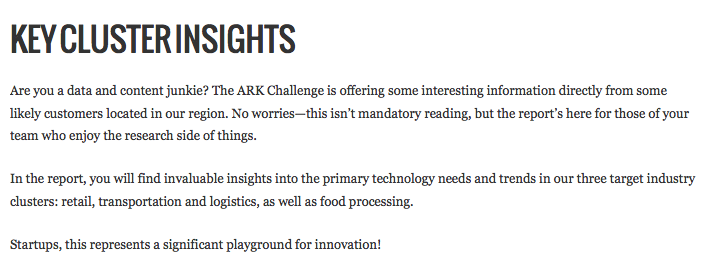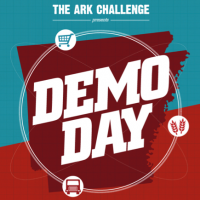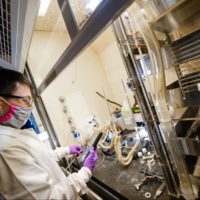Big-name accelerators that provide technology entrepreneurs with mentoring and capital in exchange for equity, like Y Combinator or TechStars, are all the rage for founders. They provide a stamp of imprimatur that can be invaluable in attracting investors. Yet as the model matures, the options seem to multiple. We have been following accelerator programs popping up around the country and became particularly interested with the ARK challenge, which launched its inaugural class in August and focuses specifically on retail, logistics and food processing startups.
Most commonly, accelerator programs are funded primarily by venture capitalists and consider any tech-enabled business idea that looks promising. In exchange for their investment in the company, mentoring and support, the accelerators take an equity stake in the startup. The stake typically ranges from 3-7% and graduates of these programs include the likes of DropBox or OnSwipe, or as is the case with 500 Startups, Craft Coffee, Culture Kitchen SF and Farmeron.
The ARK program is relatively unique in comparison. Although it too invests in each participating startup ($18,333) and takes an equity stake (6%), the program is the result of a web of public-private partnerships that include the Federal government, local education institutions, a non-profit and venture capitalists. Also, located in Fayetteville, Arkansas, ARK focuses on three clusters: retail, food processing and logistics, that mirror the specialties of some of the largest companies in the area: Wal-Mart, Tyson and J.B. Hunt, respectively. This encourages relationships between startups in the program and some of their larger corporate cousins.
“The great thing about a lot of our companies is that they are in data visualization, analytics, or social, and for the larger companies, they are welcoming the help in these emerging areas,” says Jeannette Balleza, ARK Director, “It’s the startup’s unique value proposition to them.”
Also in less-traditional fashion, ARK launched the program with a challenge brief that identified major pain points and trends within the retail, food processing and logistics clusters to help guide interested startups.
“[Startups aren’t] obliged to address one of the problems we identified.” says Balleza, “But, we wanted to show that there’s a demand first…. and create the kinds of projects that help the companies already located here.”
The first ARK class is already more than a third of the way through the program. One company currently going through it is Agricultural Food Systems, which focuses on “transforming the way food quality is measured.” The company was started by Lawson Hembree, a 2011 graduate of John Brown University, whose family has been involved in raising cattle for decades. Its first product is the TenderID, which measures the tenderness of meat on the production line.
“So far [ARK] has been a great experience,” says Hembree. “It’s just great to be around a lot of other like-minded individuals: innovators, entrepreneurs, hard workers who are building solutions to problems.”
The proximity of Tyson, and its connection with ARK, opened the door for Agricultural Food Systems to have a couple meetings with representatives of the company that work on meat processing. “[Tyson has] expressed a little bit of interest…we’re continuing to feel each other out and gauge the benefits for both of us,” says Hembree.
The idea for putting something like ARK together was sparked when the U.S. Department of Commerce put out a call for applications to “enhance regional competitiveness” last year, and some local entrepreneurs went to work. Kristian Andersen, Co-founder of Gravity Ventures, initially approached Innovate Arkansas about forming an Arkansas-based accelerator program, says Balleza. They in turn approached Winrock International, the University of Arkansas, NorthWest Arkansas Community College and companies like Walmart, Tyson and J.B. Hunt about the idea.
The group applied and was selected by the “Department of Commerce Jobs and Innovation Accelerator Challenge” as one of 20 projects nationwide to receive federal funding. It came in the form of a $2.15 million grant for operations. The money is administered by the community college and, in part, provides for education and classes in things like coding or design.
“The Jobs and Innovation Accelerator Challenge brings the public and private sectors together to build on America’s regional strengths and create local jobs in key industries of the future,” Acting U.S. Commerce Secretary Rebecca Blank said at the time, in an announcement about the winners.
One of the requirements of the federal grant program is that other parties kick in matching funds too. So, ARK received a 75 percent matching grant from Winrock International, a nonprofit focused on rural development, and a 25 percent matching grant from the University of Arkansas, according to Balleza, who, in coalition fashion, is actually on staff at Winrock. Other partners that make the program possible include Gravity Ventures and the Fund for Arkansas’ Future, which provide the equity investments.
It will be interesting to watch how this ARK model progresses and how it plays with major companies nearby. At the end of the program, two companies are guaranteed an offer of an additional $150,000 in venture capital.
“The optimal outcome is the minimum viable product that’s ready for customer development,” says Balleza. “And in the ideal world, also getting their first customers.”
We wish the first class all the best and will follow up in the coming months on how things are turning out.






